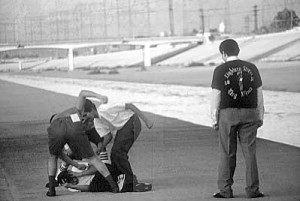If you’re the kind of person who has an active social life, including things like friends and intimate sexual relationships, then you’re probably the type of person who has something better to do than read this page. In the event you’re reading this and also manage to have those kinds of relationships, you might have noticed that people who have recently (or not so recently) been hurt will sometimes go a bit off the rails. Perhaps they opt to drink to the point of blacking out and burning down their neighbor’s pets, or they might take a more subtle approach and simply become a slightly different person for a time (a little more extroverted, a little less concerned about safe sex, or just ball up in their closet and eat ice cream for days on end). I’ve kind of touched on this issue before when considering the function of depression, so today I’m going to shift gears a bit.
I’ve written about victimhood several times in the past, and today I’d like to tie two pieces of information together to help understand a third. The first piece to consider is the Banker’s Paradox: people need to judge where to invest their social capital in so as to get the most from their investment over the long-term. Part of this assessment involves considering (a) whom your social capital would be most valuable for and (b) how likely the recipient of that investment would be to return in. Certain classes of people make better investment targets than others, depending on the context you currently find yourself (and them) in. The second piece of information involves how people attribute blame to victims and heroes: victims (conceptualized as someone that has a bad thing happen to them) are blamed less than heroes (conceptualized as someone who does good deeds) for later identical misdeeds.
In light of the Banker’s Paradox, the second finding makes more sense: victims may often make better social investment targets than heroes, at least with regard to their need for the assistance. Accordingly, if you’re looking to invest in someone and foster a relationship with them, casting them in a negative moral light probably won’t go very far towards achieving that goal. At the very least, if victims make better investment targets for other people, even if you aren’t looking to invest in that victim yourself, you run the risk of drawing condemnation from those other parties by siding against the victim they’re trying to invest in. To clarify this point, consider the story of Robin Hood; even if you were not benefiting directly from Robin stealing from the rich and giving to the poor, condemning him for theft would be unlikely to win you much support from the lower class he was helping. Unless you were looking to experience a public embarrassment and/or beating, keeping quiet about the whole stealing thing might be in your best interests.
With that in mind, it’s time to turn this analysis towards the perspective of the victimized party, who, up until now, has been treated in a relatively passive way; as someone who things happen to, or someone who receives investment. Third parties, in this scenario, would invest socially in victims because the victims hold real or potential social value. This value could in turn be strategically leveraged by victis in order to achieve other useful outcomes for themselves. For instance, if victims are less likely to be morally condemned for their actions by others, this would give victims a bit of moral wiggle room to behave more selfishly towards others while more effectively avoiding the consequences of their actions. As summed up by The Joker in The Dark Knight, “If you’re good at something [or valuable to someone], never do it [or be that] for free”.
“Also, don’t exceed the recommended daily dosage on your drugs”.
This hypothesis was inadvertently tested by Zitek et al (2010), who examined the link between perceiving oneself as a victim and subsequent feelings of entitlement. I say inadvertently, because, as is usually the case in psychology research, their experiment was carried out with no theory worth mentioning. Essentially, this research was done a hunch, and the results were in no way explained. While I’d prefer not to have to harp on this point so frequently, it’s just too frequent of an issue to ignore. Moving on…
In the first experiment, Zitek et al (2010) asked two groups of subject to either (a) write about a time they were bored or (b) write about a time life treated them unfairly. Following this, subjects were asked three questions relating to their sense of entitlement. Lastly, subjects were given a chance to help the experimenter with an additional task, ostensibly unrelated to the current experiment. This final measure could be considered an indirect assessment of the subject’s current altruistic tendencies. When it came to the measures of entitlement, subjects who wrote about an unfair instance in their life rated themselves as more entitled than the control group (4.34 vs 3.85 out of 7, respectively). Further, subjects were less likely to help the experimenter out with the additional task in the unfair condition, relative t the bored one (60% vs 81% of subjects helped, respectively).
A second experiment altered the entitlement questions somewhat and also asked about the subject’s selfish behavioral intentions in lieu of asking subjects to help out on the additional task. Zitek et al (2010) also asked about other aspects of the subject’s current negative emotions, such as anger. The results for this experiment showed that subjects in the unfair condition were slightly more likely to report selfish behavioral intentions (3.78) than subjects in the bored condition (3.42). Similarly, subjects in the unfair condition also reported a greater sense of entitlement (4.91) relative to the bored group (4.54). The subject’s current feelings of anger and frustration did not mediate this effect significantly, whereas feelings of entitlement did, suggesting there is something special about entitlement in this regard.
One final experiment got a little more personal: instead of just asking subjects about a time life was unfair to them, an experiment was run where subjects would lose out on a prize either fairly or unfairly. In the unfair loss condition, what appeared to be a computer glitch prevented subjects from being able to win, whereas in the fair loss condition the task subjects were given was designed to appear as if they were simply unable to solve it successfully in the time allotted. After this loss, subjects were asked how they would allocate money for a hypothetical experiment between themselves and another player, contingent on them outperforming that other player 70% of the time. Again, the same effect popped up, where subjects in the unfair loss condition suggested they should get more money in the hypothetical experiment ($3.93 out of 6) relative to the fair loss condition ($3.64). While that might not seem like much of a difference, when considering only the most selfish allocations of money, those in the unfair condition were more than twice as likely (19%) to make such divisions (8% in the bored group).
So, being a victim would seem to make people slightly more selfish in these cases. The size of this effect wasn’t particularly impressive in the current experiments, but the measures of victimization were rather tame; two involved experiences long past, and the third involved victimization at the hands of a relatively impersonal force – a computer glitch. More recent and more intense victimization might do something to change the extent of this effect, but that will have to be a matter for future research to sort out; research that might be a little difficult to conduct, as most review boards aren’t too keen on approving research that aims to cause significant discomfort for the subjects.
That said, many people might have easily made the opposite prediction: that being victimized would lead people to become more altruistic and less selfish, perhaps based in some proximate empathy model (i.e. “I don’t want to see people hurt the way I was”). While I certainly wouldn’t want to write off such a possible outcome, given the proper context, discussing that possibility will be a job for another day. What I will suggest is that we shouldn’t expect victimhood to make people do one and only one thing; we should expect their behavior will be highly dependent on their contexts. After all, the appropriateness of a behavior can only be determined contextually, and behaving selfishly with reckless abandon is still a risky proposition, victim or not.
References: Zitek EM, Jordan AH, Monin B, & Leach FR (2010). Victim entitlement to behave selfishly. Journal of personality and social psychology, 98 (2), 245-55 PMID: 20085398


